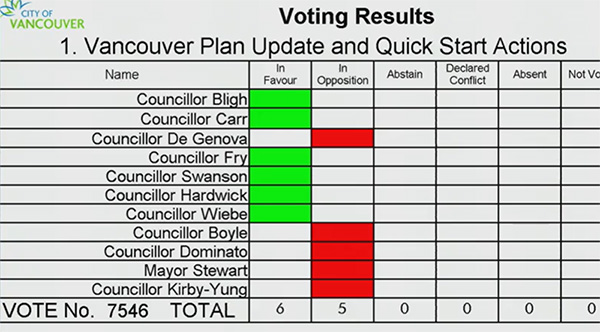A seemingly arcane amendment discussed and voted upon last week confounds easy assumptions about who leans left or right on Vancouver council and exposes some important divisions.
City staff recommended changing “vacancy control” requirements for future rental projects built under the Moderate Income Rental Housing Pilot Program, or MIRHPP.
Green party Coun. Adriane Carr objected to the proposed changes, and it was her amendment to reject them that council voted for or against. Why did she care?
Because one out of five units in a MIRHPP development must rent at frozen, affordable, sub-market rates. And this proposed change would mean that once the initial residents moved out of one of those affordable units, that unit would be rentable at raised, near market rates to the new tenant.
Why did staff recommend that change? Because, according to the development community, the vacancy control requirement was making it difficult for projects to get built.
A word here about the MIRHPP program. It allows developers to build much larger buildings than zoning allows in return for an agreement that the building be 100 per cent rental, and one-fifth of those units be affordable to households making $80,000 or less (average household income for Vancouver renters is about $50,000 per year). In return, the city agrees to forego development cost levies, reduce parking requirements, grant access to provincially backed low-interest financing, and of course allow much higher density (in recent cases at Birch Street and Alma Street more than triple the allowed density). These financial advantages can amount to many millions of dollars.
The city passes up another major revenue stream by making MIRHPP rental-only, because a condo development of such density would be charged a Community Amenity Contribution which would also generate millions, which, as I have suggested, could be funneled to affordable housing projects.
So the city gives up quite a bit of revenue when approving a MIRHPP project, and of course greenlights for a developer the substantial value of the tripling of allowable density.
But it’s not enough, staff seemed to say last week. MIRHPP is meant to be a 20-project experiment, but so far around half had been approved and developers were not rushing to help the city meet its target. The diagnosis by staff was that the city’s insistence that rents not rise when an affordable MIRHPP unit changed tenants was too much for the market to bear. The change they proposed was that rents instead be allowed to rise to 10 per cent under the going market rate when and if the units were vacated.
Why loosen the line on affordability, a big reason that some councillors voted for MIRHPP in the first place?
All to get new projects “into the pipeline.”
On that issue, there was some confusion. The mayor said (at the 1:58 mark) that there were “none in the pipeline” and that keeping the no rent increase vacancy control aspect would mean “the end of MIRHPP” because no developers were biting. But staff, when directly asked by council, said (at the 2:15 mark) there is “one active proposal” and “one or two applications that are still considered by staff to be active.”

A bare 6 to 5 majority of council disagreed with Mayor Kennedy Stewart and passed Coun. Carr’s amendment, preserving the MIRHPP vacancy controls. The mayor aligned with One City member Christine Boyle and two of the four NPA members. COPE Coun. Jean Swanson voted with Carr and her other two Green party members, along with former NPA councillors Colleen Hardwick and Rebecca Bligh in support.
What is curious about this vote is that it seems to have little to do with the public’s presumptions about which council members are “progressive” and which members are “conservative.”
The mayor along with left-of-centre One City party Coun. Boyle aligned with NPA Coun. Melissa De Genova and former NPA councillor Sarah Kirby-Yung in opposition to protecting the stricter version of vacancy control.
On the other side, Green Coun. Michael Wiebe stressed that changing the terms of an affordable housing pilot project midstream to soften its affordability seems the wrong way to run an experiment that he and others voted for precisely because of the affordability it sought to deliver. Better to just offer a new program with different rules and see whether it flies in council, he argued in supporting Carr’s amendment.
During the lengthy conversation, the mayor and others against appeared ready to accept that the market had spoken and needed more concessions to provide rentals. Those in favour were not willing to grant the market higher and less affordable rents, given that the city has already deeply subsidized the market with MIRHPP’s tax and regulatory breaks.
In my view, this vote reveals a schism in council when it comes to thinking about what it will take to deliver affordable housing in Vancouver.
As we approach the next election, voters will need to examine platforms closely. The choice will be between candidates who think relying on the market to add more and more housing supply is the path to salvation versus those skeptical of that approach. The second group makes their litmus test for new projects whether they deliver true, ongoing affordability to those left out of the market now. ![]()
Read more: Housing, Municipal Politics
















Tyee Commenting Guidelines
Comments that violate guidelines risk being deleted, and violations may result in a temporary or permanent user ban. Maintain the spirit of good conversation to stay in the discussion.
*Please note The Tyee is not a forum for spreading misinformation about COVID-19, denying its existence or minimizing its risk to public health.
Do:
Do not: